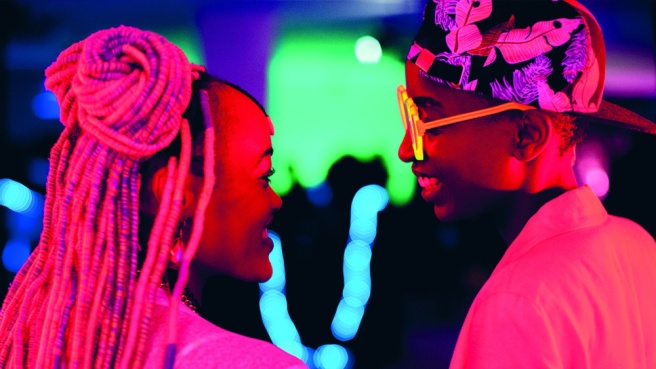
Kenyan director Wanuri Kahiu’s marvelous, joyful Rafiki tells the story of two girls in love. It’s a story that has been told before, replete with obstacles en route to what we hope will be a happy ending, but two things set this film apart from the rest of the star-crossed crowd. One, the girls live in Kenya, where a colonial-era law marks out homosexuality as a criminal offense. Two, despite the seriousness of the dangers and challenges before our heroines, their story is wildly, vibrantly fun.
Virtually every frame of this film is full of glorious color. The intensely saturated palette extends to all elements of the mise-en-scéne. Interiors, exteriors, clothes, hats, hair, makeup, laundry hanging out to dry, flowers both living and in bouquets, ingredients on the shelves of food kiosks, political campaign posters, and the decorations on motorbike taxis all nearly burst from the screen in every day-glo shade imaginable. Even the community priest wears neon purple. One beautifully filmed scene inside a nightclub shows us dancers covered in brilliant paint that comes surreally alive under black light. Even if there were no story here at all, the extraordinary sumptuousness of the film’s visual world would be enough to satisfy most filmgoers.
Luckily, the story itself is also deeply satisfying—full of sweetness, heartbreak, risk, and hope. The heroines radiate winning charm, and we immediately wish for their happiness. Kena is shy, tomboyish, and a bit of a square: smart, studious, cautious, and responsible. Ziki is popular and outgoing, fond of fashion and practicing dance moves in public with her friends. The girls pursue a relationship with each other tentatively and in secret, not just because of the homophobia surrounding them but because their fathers are political rivals whose families are thus in the spotlight, and Kena in particular is deeply loyal to her father and reluctant to do anything that might hurt him. Kena’s anxieties about being detected are realistic, as the neighborhood gossip can be relied upon to report on everyone’s behavior at the most inopportune times, and their religiously conservative families vehemently condemn same-sex relationships. When Ziki daringly and foolishly flirts with Kena in church, we can feel the imminent risk.
The sense of risk is underlined even in the film’s most casual moments. When Kena is hanging out with young men outside a food kiosk, one of the young men shouts homophobic slurs at a fashionably dressed man who passes by. Later, when the same man passes through a scene, we see that he has a large bandage on his face. No one comments on this, but Kena’s face tells us that she understands what happened. (Note: Elsewhere, the film also features a truly frightening scene of a gay-bashing. Survivors of homophobic violence may wish to go cautiously.)
Remarkably, despite the pervasive atmospheric danger, the film’s dominant note is joy, and that joy in the face of potential harm becomes an act of resistance. Characters joke around with each other; laugh loudly; dance; make out; cook and eat tantalizing food; and play checkers, cards, and sports. They hope for good grades and aspire to be nurses or doctors. They talk about their fears and dreams, and they celebrate their successes. Director Kahiu’s accent on joy is part of her commitment to break way from what Chimamanda Ngozi Adichie has famously termed “the danger of a single story” about Africa, one that focuses on what Western producers and audiences have insisted are the “important” stories about that continent—stories of war, poverty, disease, and corruption. In challenging that single story, Kahiu is doing something truly revolutionary: both redefining what sorts of stories count as important and reclaiming the right to show her homeland as she sees it, in all its rich and complicated humanity, in all its beauty and vitality. When Kena and Ziki talk about their hopes for their futures, they say that they want “something real.” Inasmuch as what’s “real” is as often light and bright as weighty and serious, Wanuri Kahiu has given us just that.
Rafiki shows Tuesday only at the Grand Cinema.
